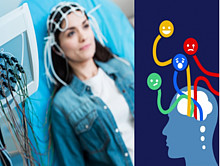Decoding the Brain

The human psyche pretty much remains a black box: we can observe or even manipulate the input a person’s psychological system receives, but not the feelings or cognitive processes that are evoked by this input. Likewise, we can observe the decisions made by the system, but not the feelings or cognitive processes that drove these decisions. In this line of research, we decode these latent processes or states from the brain, using machine learning methods applied to distributed patterns of brain activity.
The applicability and usefulness of decoding methods for marketing purposes is illustrated in a recent study on the measurement of brand image (Chan, Boksem, Smidts, 2018). A method was developed to measure an individual’s neural brand image profile. These neural profiles appeared to be associated with perceived cobranding suitability and reflected brand image strength. The neural profiling approach offers a customizable tool for inspecting and comparing brand-specific mental associations, both across brands and across consumers.
Other examples of how decoding can be helpful for marketing purposes is provided in two studies (one using EEG, and one using fMRI), where we presented participants with video content while measuring activity from their brains (Eijlers et al., 2019; Chan et al., 2020). Using machine learning, we trained classifiers to accurately decode the emotional experience evoked by these videos in our participants. Such measures can be directly applied to assess consumer experience of dynamic stimuli.
As another example, in every-day life we observe large differences in honesty and fairness across individuals. In a set of two studies (using fMRI), we decode idiosyncrasies in the underlying motivations for honesty and fairness (Speer, Smidts & Boksem, 2020). We find that particularly individual differences in the engagement of cognitive control and theory of mind drive differences in prosocial behaviour.
Publications
Chan, H-Y., Boksem, M., Venkratraman, V., Dietvorst, RC., Scholz, C., Vo, K., Falk, E. B. & Smidts, A. (2023). Neural signals of video advertisement liking: Insights into psychological processes and their temporal dynamics. Journal of Marketing Research, 1-23. https://doi.org/10.1177/00222437231194319
Speer, S.P.H., Smidts A. & Boksem,M.A.S., (2020). Cognitive control increases honesty in cheaters but cheating in those who are honest. Proceedings of the National Academy of Sciences of the United States of America, 117 (32), 19080-19091. doi: 10.1073/pnas.2003480117
Speer, S.P.H., Smidts A., Boksem, M.A.S. (2020). When honest people cheat, and cheaters are honest: Cognitive control processes override our moral default. BioRXiv, doi:10.1101/2020.01.23.907634, preprint
Speer, S.P.H., Boksem, M.A.S. (2020). A multi-voxel investigation of proposers' heterogeneity in the ultimatum game. Social Cognitive and Affective Neuroscience, 14 (11), 1197-1207. doi:10.1093/scan/nsz097
Chan H.Y., Smidts A., Schoots V.C., Sanfey A.G. & Boksem M.A.S. (2020). Decoding dynamic affective patterns to naturalistic videos with shared neural patterns. Neuroimage, 216, 116618. doi: 10.1016/j.neuroimage.2020.116618
Eijlers, E., Smidts, A. & Boksem, M.A.S. (2019). Implicit measurement of emotional experience and its dynamics. PLoS One (online)
Chan, H.Y. Boksem, M.A.S. & Smidts, A., (2018). Neural profiling of brands: Mapping brand image in consumers' brains with visual templates. Journal of Marketing Research 55(4), 600-615
See also
Eijlers, E., Boksem, M.A.S., Smidts, A. (2020). Arousal and advertising success: Neural measures suggest that arousing ads stand out more but are liked less. Frontiers in Neuroscience.
Couwenberg, L.E., Boksem, M.A.S., Dietvorst, R.C., Worm, L., Verbeke, W.J.M.I. & Smidts, A. (2017). Neural Responses to Functional and Experiential Ad Appeals: Explaining Ad Effectiveness. International Journal of Research in Marketing, 34 (2017) 355-366

